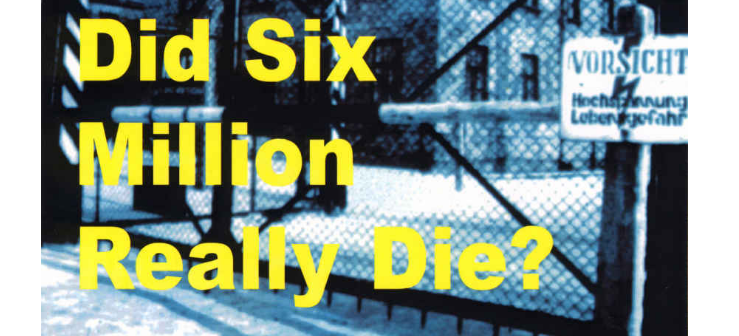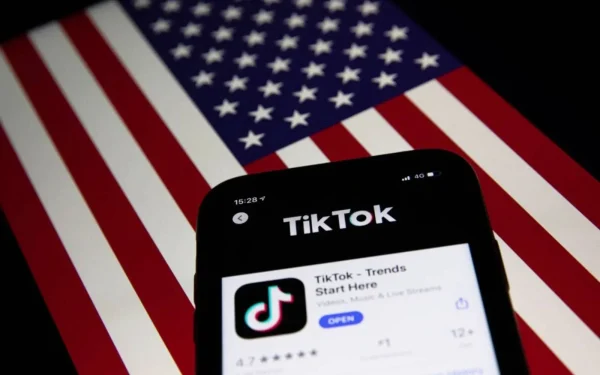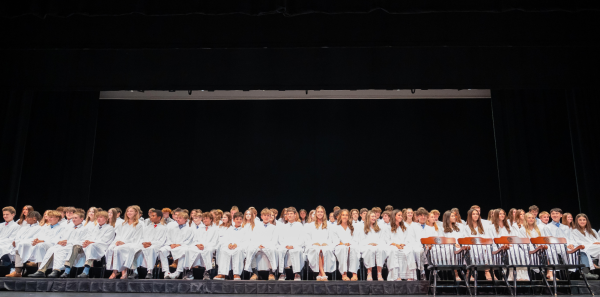Free Speech Does Not Mean a Free Pass
Photo courtesy of www.forward.com
This book was one of the ones Amazon stopped selling after anti-discrimination groups clamored for its removal from the Internet retailer.
It’s beyond clear that the Holocaust happened. There is plenty of evidence, like the hundreds of photos, videos, and documents like the The Diary of Anne Frank, not to mention the remains of concentration camps and millions of bodies which prove that the Holocaust occurred. And, if you still don’t believe the Holocaust took place, there are the confessions from Nazi officers which tookplace during the Nuremberg trials and such confessions are even being made today. According to bbc.com, In 2015, Nazi SS officer Oskar Groening, at the age of 94, was sentenced in four years in prison for his role as the accountant at Auschwitz, one of Nazi Germany’s death camps. “I saw everything,” Grening testified in court. “The gas chambers, the cremations, the selection process. One and a half million Jews were murdered in Auschwitz. I was there.”
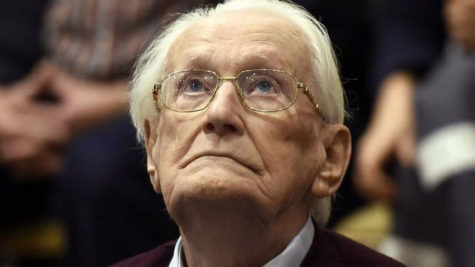
Former Nazi SS officer Oskar Groening stands trial for his involvement with the Auschwitz death camp in April of 2015.
However, there are people who deny the atrocity of the Holocaust ever took place. Perhaps they are in disbelief that such a heinous act could be carried out, or perhaps they are merely antisemitic. Regardless of their reasons, their viewpoints and ideas are posted on the Internet and published in books. Recently, Amazon, the world’s largest Internet-based retailer, has been accused of selling books denying the Holocaust. Some of those titles included Holocaust: The Greatest Lie Ever Told by Eleanor Whittakers; The Hoax of the Twentieth Century: The Case Against the Presumed Extermination of European Jewry by Arthur R Butz and Did Six Million Really Die? by Richard Harwood.
As of the writing of this article, due to pressure from Jewish groups who accused Amazon of giving a platform to antisemites, Amazon has stopped selling those three books mentioned above.
However, this is where the First Amendment of the U.S. Constitution comes into play. Of course, Amazon has the right to decide which books it will or won’t sell on its site, but what if multiple stores and retailers, online and otherwise, decided to not carry such books? Is such collusion among booksellers, while based on principals, a direct violation of our nation’s First Amendment which guarantees free speech?
If someone in France, Germany, or Spain were to deny the Holocaust, that individual would be arrested because, in those countries, it is against the law to refute the Holocaust. According to an April 2007 article in the New York Times (“EU Adopts Measure Outlawing Holocaust Denial”), the legislation “calls for jail terms for as much as three years for ‘intentional conduct’ that incites violence or hatred against a person’s ‘race, color, religion, descent, or national or ethnic origin.’ The same punishment would apply to those who incite violence by ‘denying or grossly trivializing crimes of genocide, crimes against humanity and war crimes.’
That is not the case in America – we are not arrested for our ideas or our words which is one of the freedoms that sets us apart from the rest of the world. Whether we agree with certain ideas or not, shouldn’t those ideas be allowed to be heard, no matter how preposterous they may be?
The United States Holocaust Memorial Museum, which Benjamin’s eighth-grade has the honor of attending each year as part of their Washington, D.C. trip, asserts on its website (www.ushmm.org) that “Holocaust denial and minimization or distortion of the facts of the Holocaust is a form of antisemitism.” However, the website also goes on to say that, “In the United States, where the First Amendment to the Constitution ensures freedom of speech, it is not against the law to deny the Holocaust or to propagate Nazi and antisemitic hate speech.
So while Holocaust denial is deemed by the memorial museum to be racist, it is not against the law in America. Some would say that anti-Holocaust ideas are also a form of hate speech, but, according to the First Amendment, “hate speech” is not defined by U.S. Law.
According to the Washington Post article “No, There’s No ‘Hate Speech’ Exception to the First Amendment” article written by Eugene Volokh, “U.S. law has just never had occasion to define ‘hate speech’ — any more than it has had occasion to define rudeness, evil ideas, unpatriotic speech, or any other kind of speech that people might condemn but that does not constitute a legally relevant category.”
The article also states that, “Hateful ideas (whatever exactly that might mean) are just as protected under the First Amendment as other ideas. One is as free to condemn Islam — or Muslims, or Jews, or blacks, or whites, or illegal aliens, or native-born citizens — as one is to condemn capitalism or socialism or Democrats or Republicans.”
However, what do our students think? A good portion of Benjamin’s middle school population is Jewish, and those students have some strong opinions about anti-Holocaust literature and if such works have the right to be sold in the U.S.
“It is obviously not right [to deny the Holocaust] because it denies something that [actually] happened,” said seventh grader Liv Simon. “Millions of people died during the Holocaust and the fact that the [authors] deny that, all those deaths, is just not right. You may have the right to say these thing but it doesn’t mean you should.”
Eighth grader Lauren Papa agrees, and blames both the authors and the retailer for proliferating the anti-Holocaust literature. “The people who wrote the books should get blamed, but Amazon should not have helped them get the books out to the world,” she said.
A recent example of hate speech came into play within the arena of Major League Baseball. On May 1, Baltimore centerfielder Adam

Baltimore Orioles centerfielder Adam Jones was the victim of racial slurs during the team’s visit to Boston’s Fenway Park on May 1, 2017.
Jones, an African-American, told reporters after a game against the Boston Red Sox at Fenway Park that he was the victim of racial slurs during the game. According to Jones, “A disrespectful fan threw a bag of peanuts at me,’’ he said. “I was called the N-word a handful of times tonight. Thanks. Pretty awesome,’’ he sarcastically remarked.
The Red Sox denounced the behavior, and the fan who threw the peanuts was ejected from the ballpark, but the fans who used racial slurs were not identified, and, as a result, no action was taken against them. However, the next evening, after a fan at Fenway used a racial slur to describe the Kenyan woman who sang that night’s national anthem, a caucasian man who was attending the game with his mixed-race son and black father-in-law, alerted security. The individual who used the slur was ejected and banned for life from the park, a move that the Red Sox say may be unprecedented in the history of Major League Baseball.
The man, exercising his right to free speech, was, of course, not arrested, but because he was rude and offensive, he was kicked out of the park. As one who purchased a ticket from the Red Sox organization, he violated the contract of any ticket holder who, by renting a seat to watch a game, agrees to abide by the guidelines set forth by the ball club. For example, security guidelines on www.redsox.com state that “any fan that directly or indirectly interferes with the enjoyment of the game will be promptly ejected from Fenway Park and may be subject to arrest and prosecution by the Boston Police.”
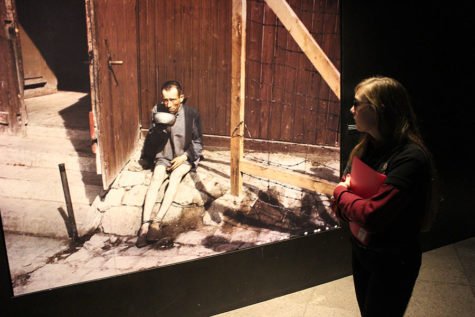
In the Holocaust Memorial Museum, eighth grader Briley Crisafi walks past a giant photo of a death camp survivor during the Allies’ liberation at the end of WWII.
The Benjamin School works hard to ensure its students understand our Constitution and that everyone has the right to feel safe and secure within society. Not only does the School employ the help of the Anti-Defamation League each year to talk to students about acceptance and tolerance, but Benjamin uses history to teach such important lessons. Eighth-grade history teacher Mrs. Anne Franzen used the Holocaust as the focal point for the eighth-grade monuments project this year. Each history class was split into groups and needed to construct a papier-mache monument in the vein of a popular artist that paid homage to a Holocaust victim or survivor, telling that actual individual’s story. In addition, the eighth graders visit the United States Holocaust Memorial Museum during their annual trip to Washington, D.C.
“It is one of the most profound educational experiences, especially for the middle school students,” said Franzen. “They can see first hand what the effects of bullying and scapegoating are in the worst form.”
The seventh graders also studied the Holocaust during their recent Civil Rights unit. “We feel very strongly here at The Benjamin School [about teaching about The Holocaust] because we are talking about civil rights, and this event is the ultimate violation of civil rights and the ultimate example of how people’s right are violated,” said History Department Chair Mr. Marshall Mullinix.
So as much as freedom of speech is protected in the United States and one may not be arrested for what he or she says, that doesn’t mean there will not be consequences – just ask the authors of those anti-Holocaust books that Amazon is no longer selling and the Red Sox fan who is now banned for life from Fenway Park.
Yet even as racist, ridiculous, and intolerable as anti-Holocaust sentiments are, the truth is that we live in a country where such ideas and speech are protected. It’s one of the freedoms that makes the U.S. unique and admired, even if such speech isn’t worth admiring at all.
